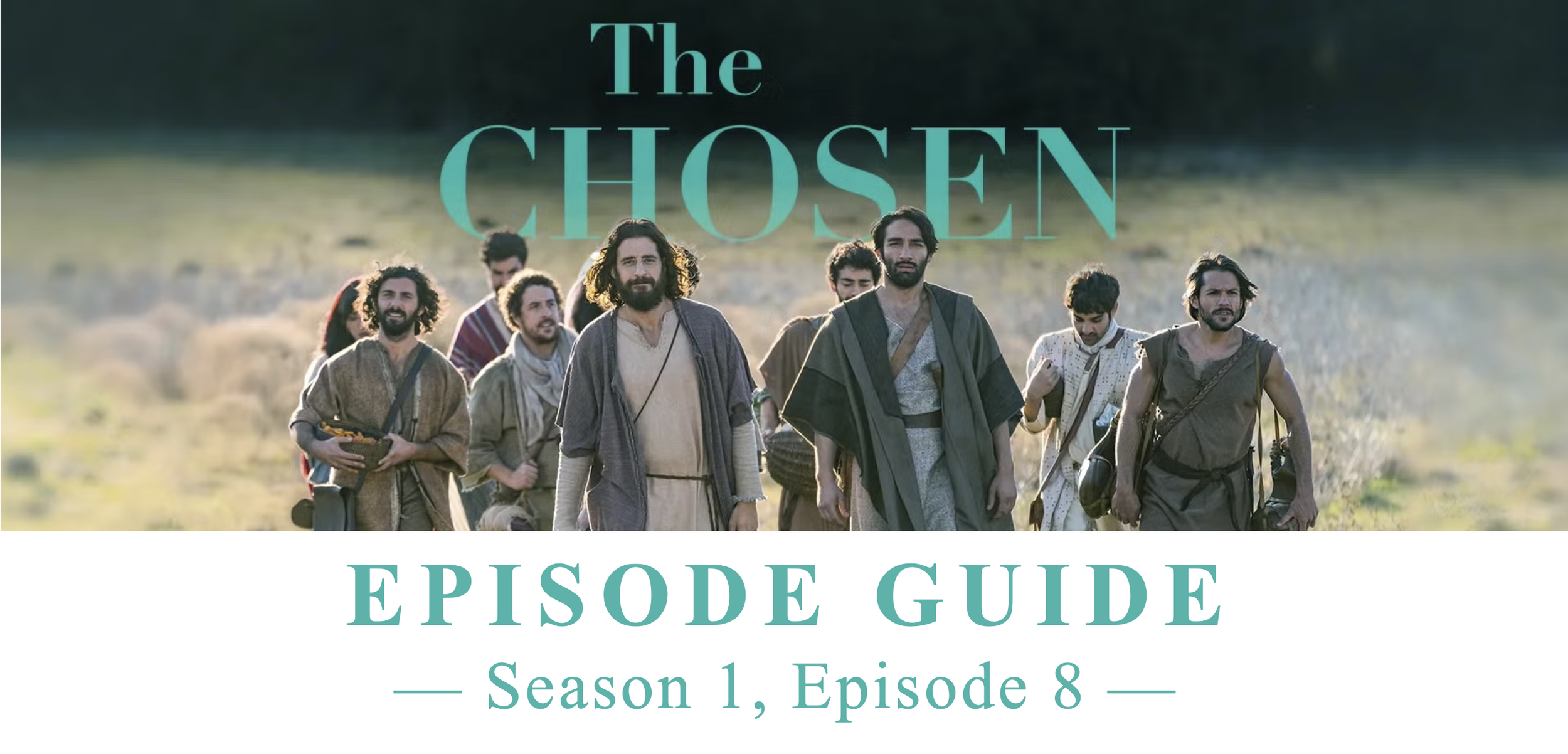The Chosen Episode Guide: Season 1, Episode 8
S1, E8
It has been a few weeks since I have posted an episode guide, but here we find ourselves back into Season 1 after having tackled Season 5. I will continue to work my way through each of the seasons week by week.
Biblical: What We Find in Scripture
While much of the detail is added, the disciple Matthew, who was also a tax collector, had a dinner in his home for Jesus (Mt. 9:9-13; Mk. 2:13-17; Lk. 5:27-32). Matthew is called Levi in the texts in Mk and Lk, Matthew’s original name. While we don’t know how or why some of the Pharisees saw this, and while we don’t know the names of any of the Pharisees who did, we know that they were disturbed that Jesus would be willing to eat with social outcasts like tax collectors. When questioned about his reason for eating with them, Jesus replied that it is the sick and not the well who are in need of a physician.
Some of the events around the healing of Simon’s mother-in-law are certainly fictional, particularly the parts about Jesus healing her to relieve the burden of Peter’s wife and to keep Peter from being anxious while traveling with Jesus. However, the actual healing is pretty close to correct. Mt. 8, Mk. 1, and Lk. 4 all record the event. As we consider them all, we see that Jesus entered Peter’s house, took the hand of Peter’s mother-in-law, rebuked the fever, and that she got up and began to serve them.
There is a lot of liberty taken in the dialogue with the Samaritan woman at the well, but much of the biblical dialogue from John 4 is there as well. Jesus asks her for water, she is surprised that a Jew would ask her for water, and Jesus offers her living water. She perceived him to be a prophet, but he told her that he was the Messiah. She does go into the city and tell people about Jesus. In the biblical record, Jesus does not recount each of the husbands of the Samaritan woman, nor does he claim to know Jacob, who dug the well. The woman does ask Jesus about what mountain people are to worship on. This is because the Jews worshipped and sacrificed on Mt. Moriah, where the temple was and where the Dome of the Rock is today. The Samaritans had their own version of the Scriptures and offered their own sacrifices on Mt. Gerizim. In essence, she was asking who was right. Jesus was indicating that Father wasn’t seeking worshippers who worship on one mountain or another, but who understand him to be the Messiah and worship God in Spirit and in Truth.
After the Samaritan woman went into town to tell people who she had met, the disciples arrived marveling at who Jesus was willing to have a conversation with. They encouraged Jesus to eat, to which Jesus responded by saying that he had food to eat that they didn’t know about. Of course, he was talking about doing the work that the Father had for him to do. Jesus and the disciples also stayed there for a couple of days and ministered in that region.
Unbiblical: What Contradicts Scripture
Nothing
Extra-biblical: What Is Made Up but Doesn’t Contradict Scripture
This episode, like others, opens with a flashback to Old Testament events. Clearly, this opening scene is a set-up for the conversation of the Samaritan woman at the well of Jacob. However, this cannot be biblical as there is no information about Jacob’s well given in the Old Testament. It is mentioned in the New Testament, and Genesis 33 says that Jacob lived near a well. However, the only reference to Jacob’s well in the New Testament is found in John 4, where Jesus meets with a Samaritan woman at what is traditionally thought to be Jacob’s well. In truth, almost nothing is known about this well and its location.
There are no biblical characters named Neriah nor Photina. These characters in the scene following the title sequence are fictitious.
As previously mentioned, almost nothing is said of Nicodemus in the New Testament. His role in this episode, which occurs in several scenes, continues to be entirely fictional.
Quintas and Gaius are still fictional characters and therefore their role in any episode is not from the Bible.
While Peter is recorded as having a wife in the New Testament, no conversation is recorded in Scripture where the disciples and Jesus discuss this and its effects on the disciples who are married vs. single.
I don’t know who the characters are supposed to be in the scene where a woman purchases an orange in the marketplace, but this is not in the biblical record. This woman is later revealed as the Samaritan woman at the well.
At no point in the Bible are we told that there was a decree written from any Roman ruler forbidding worship gatherings outside of a temple, synagogue, or Hebrew school. The Roman soldier issuing the decree, whether Quintas or Gaius ( I don’t know; I believe it to be the latter), are fictional characters. We also don’t know of any Roman leader seeking the questioning of Jesus in the Bible until the Sanhedrin delivered Jesus to Pontius Pilate. We do know that Herod Antipas wanted to meet Jesus because he thought he was some type of incarnation of John the Baptist, whom he had beheaded earlier.
There is no record in the Bible of Nicodemus leaving money for Jesus, nor of Jesus encouraging Nicodemus to join them while Nicodemus is waiting in the shadows.
The meeting of the Roman soldier Quintas (I think that is his name in this episode) with Matthew’s parents is not recorded in the Bible.
Helpful: What We Might Be Helpful To the Watcher
While we don’t know how Matthew left his job as a tax collector, he certainly did leave that role to follow Jesus. The Roman tax system was called the publicany (called a publicanus in this episode). Publicans, or tax collectors, would buy tax districts. They were to give Rome what was due them, and they were able to keep whatever they could extort from the people in their district. It is possible, maybe even probably based upon the biblical accounts, that Matthew just walked away. If he did, the district would have been sold to someone else.
While Jesus doesn’t use the phrase as “I am God” as we would understand it in English, he nonetheless claimed divinity in a way that the people of the day would have understood it. Nicodemus’s conversation with one of the rabbis about Jesus’s claim to be God is helpful in seeing that the people in his day clearly understood him to be making that claim. An unhelpful part of this dialogue is when the rabbi that speaks to Nicodemus calls the law God. That seems to be a judgment on the part of the authors of this episode about the Jews in that day. However, the rabbis would not have claimed that the law was God even though they took obedience to the law very seriously as an act of worshipping and obeying God.
The disgust of the Jews for the Samaritans is captured well in the scene where Jesus suggests to the disciples that they will be traveling through Samaria. While there are some historical reasons that are given in this episode, the biblical reason is not. The Samaritans were the offspring of the Jews who were left behind in the Babylonian captivity and married foreign wives. They were considered to be something of a half-breed, if you might pardon the term. They were hated by the Jews for that reason.
Dangerous: Things That Have Been Added That Might Be Dangerous to Accept as Fact
I believe that there is a danger inherent in every episode, and for that reason, I will begin to state what is in each episode guide. The danger is assuming that the things in the episodes of the Chosen that are not in the Bible are true, part of the biblical record. In order to avoid this danger, I would encourage everyone who watches the Chosen to compare it to the biblical record. IN part, this is because most of what is in each episode of the Chosen is not found in the Bible. There is more speculation here than actual events recorded in the Bible. If you want a harmony of all of the gospels in chronological order to aid this, then I would recommend purchasing a copy of One Perfect Life by John MacArthur. It is a compilation of all of the gospel records in order of the events as best as we can understand.
Anachronisms and Errors: Things that are out of place regarding the time, etc.
The order that was decreed about not having worship gatherings outside of certain places was said to be posted in Aramaic, Latin, and Greek. The order that God posted was only in Aramaic.
While the events of Matthew’s parents being given to his house are fictional, there is something erroneous about Matthew’s parents meeting his dog. Dogs were not considered to be household pets like they are today; they would have been thought of as disgusting creatures, even if not unclean.

